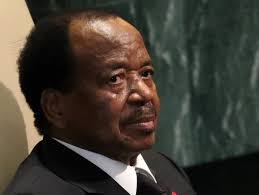Cameroon President Paul Biya is preparing to call a caucus on ending the conflict in the English speaking regions of the country where separatists have been fighting government forces for close to two years.

Prime Minister Joseph Dion Ngute said during his ongoing peace mission in the western parts of the country that the president was willing to “listen to all other issues with the exception of separation or secession.”
Since it flared up in 2017, the unrest has left 1,850 dead, 560,000 internally displaced and 32,000 others have taken refuge in Nigeria as President Biya’s government sought to overran the separatists with military might.
“I am here in Bamenda with a message of peace and hope from President Paul Biya,” he said in Bamenda last week on what was his first visit to the Northwest region.
“With the exception of separation or secession, the Head of State is prepared to hold a dialogue where every other topic can be discussed,” he said.
He added president Biya was looking for people to represent all interests in the caucus.
“He is organising that and is prepared to listen to every other issue,” Dr Ngute said.
He did not give any timeline.
A conference on the future of Anglophone Cameroon that was to be held in November last year was cancelled after the government declined to give it a go-ahead.
However, Dr Ngute appeared to be assessing the ground for a political solution to increased violence and social upheaval in the regions whose agitation for independence arises from grievances of neglect compared to the francophone parts of the country. He met with community leaders, governors and other stakeholders.
Women and students carrying placards on reconciliation greeted Dr Ngute on Tuesday as he arrived to his native South West region in the second lap of the weeklong peace mission in the conflict-hit english speaking regions.
His arrival in the regional capital of Buea on Tuesday came as the United Nations warned the deteriorating security and humanitarian crisis in the west of the country could spiral out of control.
In the first informal meeting of the Security Council on Monday, UN humanitarian chief Mark Lowcock said the number of people in need of aid in the central Africa country was 4.3 million, up by a third from that last year.
This has been exacerbated in part by an influx of refugees from the Central African Republic and Nigeria. “The level of the crisis is more alarming than ever,” Mr Lowcock said.
African members of the security council – Equatorial Guinea, Ivory Coast and South Africa -, China and Russia, however, said the crisis was not a threat to international peace to warrant UN intervention in Cameroon’s affairs. Instead, they argued, the international community should support Cameroon in tackling the civil strife.
Germany, Britain and the Dominican Republic also attended the session.
Chances of a truce have increased going by Dr Ngute’s statement President Biya had softened his stance and was now ready for dialogue in resolving the armed conflict.
Cameroon’s Ambassador to the United Nations, Michel Tommo Monthe told the council that Yaounde was “on its feet, standing tall, leading a methodical fight against terrorism, secessionism, subversion and insurgency.
“The Government of Cameroon reiterates the commitment and measures taken by President Paul Biya to strengthen dialogue, accelerate the process of decentralization and empower regions,” Monthe told the council.
The PM arrived Bamenda in Northwest traditional regalia and holding a peace plant last Thursday.
At the entrance into his hotel, the Head of Government was welcomed by a group of wailing women, draped mostly in black with orange headscarves, under the umbrella of the South West-North West Woman Task Force (SNWOT).
They brandished placards with messages such as “War destroys, it does not build,” “We cry for our children, we cry for our future,” “conflict is inevitable but violence is a choice.” The women told Dr Ngute they had been crying for peace to return to the region as they could no longer bear the brunt of the war.
“President Paul Biya wants peace to reign and there is a need for the boys fighting to leave the bushes and drop their guns. They are losing a good education and should join reintegration into normal life,” Dr Ngute said in response.
The conflict has been deadlocked with the Biya regime maintaining it cannot dialogue with secessionists and separatists who in turn refused to cede ground on independence.”
The change of heart by Yaounde regime comes in face of international pressure from among others the United Nations, the European Union and the International Crisis Group.
“This is a positive step, and we hope it will be followed by concrete and meaningful actions,” said Comfort Ero, ICG Africa Program Director.
The leading opposition political party in Cameroon, the Social Democratic Front (SDF) however, says the Biya regime has to fulfill certain pre-requisites before genuine dialogue could take place.
“The government should release all those arrested in connection to the crisis, designate a mediator, declare an immediate bilateral ceasefire and make room for international observers to enforce its implementation and sanction violations,” a delegation led by party chairman, Ni John Fru Ndi told the PM during a meeting in Bamenda.
Violence erupted in the Cameroon’s two English speaking regions when an industrial strike by aggrieved lawyers and teachers in 2016 over perceived marginalization turned into a clamour by armed separatists for outright independence of the region.
Killings, torching of villages and kidnapping for ransoms and other human rights abuses perpetrated in the fight over a new state called Ambazonia continue to be reported almost on a daily basis.
The UN Commissioner for Human Rights Michelle Bachelet Jeria who visited Cameroon last week said the government should exploit a “short window of opportunity” to reduce tension and restore trust before the situation got out of control.
Kindly follow us on twitter:@AfricanVoice2









